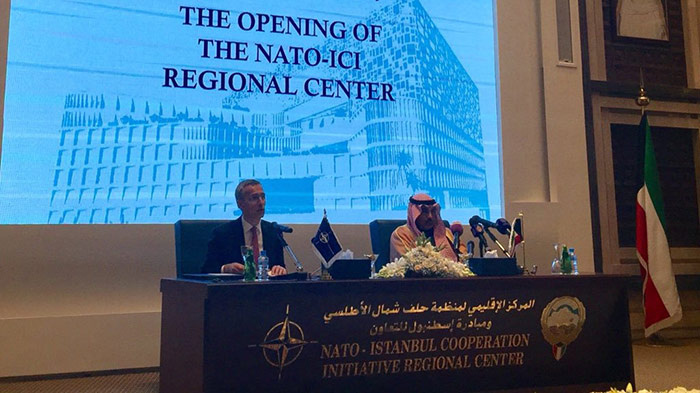Is a Security Pact Shaping against Iran in the Persian Gulf?

An analysis published on Principlist Iranian website Tabnak, affiliated with IRGC commander and former presidential candidate Mohsen Rezaei, has shed light on a lesser noted dimension of recent developments aimed to resolve differences between Iran and Persian Gulf states. Pinning down two separate updates that came in over the past month, a Tabnak article published on Saturday stresses the importance of mutual measures to reduce tensions in the Persian Gulf.
Referring to President Hassan Rouhani’s recent visit to Kuwait and Oman on Wednesday, the article reiterates that little details have been publicized on the issues brought up during negotiations. “They might be over a solution to the Yemeni crisis, or the future of Syria and Iraq, or even a wider context for initial steps toward a short- or mid-term plan to reduce tensions between Iran and governments that feel more assured now that US President Donald Trump has promised to control Iran,” reads the article. Regardless of details from the visit, the article points out, of importance are the security and military steps Persian Gulf states have begun – the outcomes of which appear to tip scales in the region up against Iran.
As an evidence for the theory it puts forward, the article points out the opening of NATO’s regional center in Kuwait on January 24th. NATO Secretary General Jens Stoltenberg called the headquarters a vital hub for practical cooperation between NATO and its partners in the Persian Gulf. The NATO center aims to provide security and military assistance to Persian Gulf states through advanced training courses on cybersecurity, energy security and chemical, biological and nuclear weapons. The headquarters comes as a part of NATO’s political dialogue and practical cooperation with four Gulf Cooperation Council (GCC) members, namely Bahrain, Kuwait, Qatar, and the United Arab Emirates, through NATO’s Istanbul Cooperation Initiative (ICI) launched in 2004. Oman and Saudi Arabia are also trying to join the Initiative.
Yet another report Tabnak puts its finger on is a story published by the Wall Street Journal (WSJ) which quoted Middle Eastern officials as saying the Trump administration was involved “in talks with Arab allies about having them form a military alliance that would share intelligence with Israel to help counter their mutual foe, Iran”. The alliance would include countries such as Saudi Arabia and the United Arab Emirates that are avowed enemies of Israel, as well as Egypt and Jordan, which have longstanding peace treaties with Israel, according to the WSJ. Other Arab countries could also join the alliance. The U.S. would offer military and intelligence support to the alliance but neither the U.S. nor Israel would be part of the mutual-defense pact. The new alliance’s first test would be in Yemen. The U.S. would step up military aid to the Yemen campaign and secure the Red Sea, a vital global shipping route threatened by the war, according to two officials. In late January, the Houthis—Iran’s allies in Yemen—launched a deadly attack on a Saudi warship in the Red Sea.
Tabnak goes on to argue that given its goals and mechanism, NATO’s center in Kuwait would not be a challenge for Iran. This contradicts a separate article that appeared on Thursday on Tahlil-e Iran political website, which argues that NATO’s partnership with the Persian Gulf Cooperation Council members is flawed in its singling Iran out from security in the region.
Back to Tabnak, the new NATO-like alliance strikes the moderate conservative website as a direct threat, which could stir the power equilibrium against Iran. Even before its operation, Tabnak argues, the establishment of the alliance would complicate the security of the region. “The mere formation of a security-military pact against Iran would aggravate Iran’s concerns, especially when intelligence and logistic presence of Israel is added... Such an alliance would pave the way for joint military action against Iran,” the article adds. The argument set forth is that, after the foundation of the alliance, Iran’s support for Houthis would be taken as the country’s military action and the members of the pact would reserve a right to retaliate. The article then turns toward the potential consequences of such a pact, whose “tectonic” security scope would largely affect the present power structures in the Middle East, pulling Russia and China in. While the Saudi Arabia wants to seize the Trump opportunity to quickly stir and redefine order in the Persian Gulf and the Middle East, Iran should approach Persian Gulf states in order to put an end to such efforts as soon as possible, the article advises.

